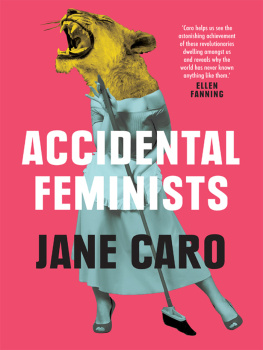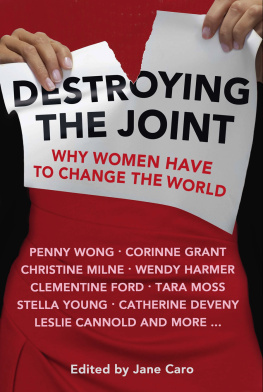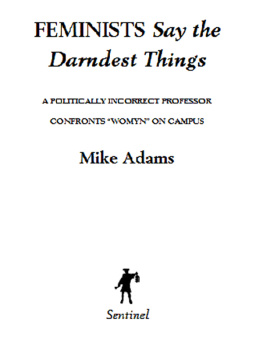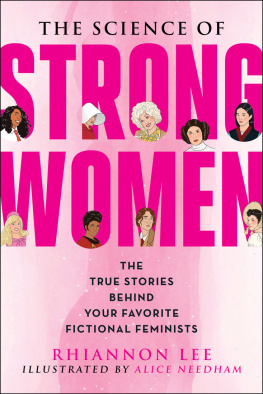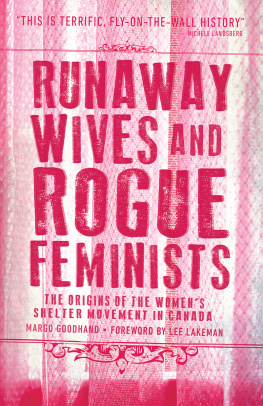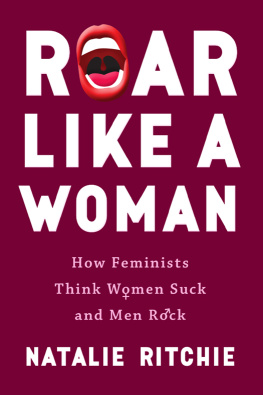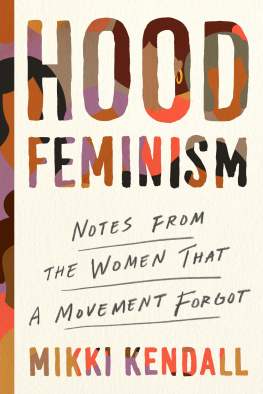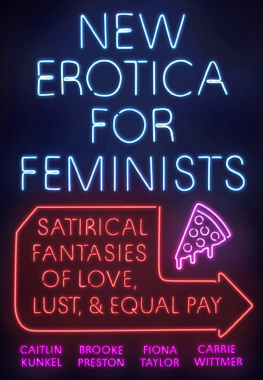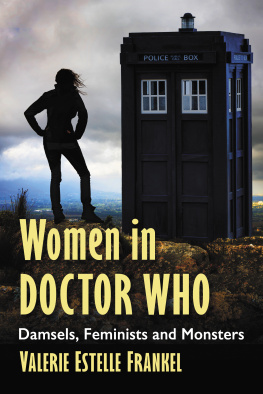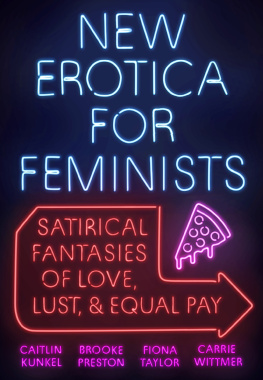ACCIDENTAL
FEMINISTS
JANE CARO

MELBOURNE UNIVERSITY PRESS
An imprint of Melbourne University Publishing Limited
Level 1, 715 Swanston Street, Carlton, Victoria 3053, Australia
www.mup.com.au
First published 2019
Text Jane Caro, 2019
Design and typography Melbourne University Publishing Limited, 2019
This book is copyright. Apart from any use permitted under the Copyright Act 1968 and subsequent amendments, no part may be reproduced, stored in a retrieval system or transmitted by any means or process whatsoever without the prior written permission of the publishers.
Every attempt has been made to locate the copyright holders for material quoted in this book. Any person or organisation that may have been overlooked or misattributed may contact the publisher.
Text design and typesetting by Megan Ellis
Cover design by Design by Committee
Cover image by Josh Durham/Bigstockphoto
Printed in Australia by McPhersons Printing Group

9780522872835 (paperback)
9780522872842 (ebook)
To Ralph
May we continue to grow old together
CONTENTS
INTRODUCTION
The generation born after World War II are usually referred to as the baby boomers. The boomers, both male and female, have had a huge impact on the world. They were bound to, I suppose, considering when they were born and their sheer numbers. However, it is boomer women who, in my opinion, have really made the greatest and most lasting difference. They have changed everything but they didnt grow up expecting to be revolutionary. They are the accidental feminists.
They are the first generation of women in the history of the world who have mostly earned their own money for most of their lives. That, in itself, is revolutionary.
They are also my generation. I am a tail-end boomer, born in 1957. I grew up when they grew up and have lived through the world the boomers were raised in, absorbed the messages we were sent about our futures, and experienced the way all those seemingly immutable assumptions were blown out of the water. Its been a hell of a ride, and its not over yet. Nevertheless, I somehow feel as if the revolution that has occurred in the lives of women remains relatively unacknowledged. Its as if each step forward is regarded in isolation and many people still seem to live with the expectation that any day now, women will go back into their box and live the way they always used to. I dont think that is going to happen, and this book is my attempt to explain why.
It is also an attempt to tell the life story of my generation of women. As I was raised in Australia, it focuses on the experiences of women from that countrybut I do not think those experiences are radically different from those of women over fifty-five in other parts of the Western world. We all lived through and benefited from the technology that changed our opportunities and the way we were able to contribute. The two particular technologies that enabled us to live such different lives are reliable contraception and the tampon. We also lived through and benefited from what is called the second wave of feminism in the 1970s, when I was still an impressionable teenager. (The first wave of feminism was the fight for the vote.) We are currently living through what will probably end up being called the third wave, and it is accelerating the change in womens lives at a speed that makes my head spin.
I have been an active participant in the changes in womens lives, as a rebellious teenager, a university student, a career woman, a wife, a mother, a grandmother andalwaysa feminist. I have also been a grateful beneficiary. Like many of my peers, I have lived a much more interesting, varied and exciting life than almost any woman from the generations who came before me. But this book is neither a memoir nor a biography, although where my own life and experiences have seemed relevant I have not hesitated to draw on them. Rather, it is the story of a generation who grabbed their unexpected opportunities and ran with them.
But this book is also the story of two fates, because not all the women of my generation have benefited in the same way. Far too many of my boomer sisters now find themselves staring down the barrel of a poverty-stricken old age. Indeed, it was my horror at discovering a few years ago that so many of my contemporaries had been left high and dry that motivated the writing of the article that led to this book.
I began by asking myself why so many women of my generation were doing well and, conversely, why so many were doing badly. I am not sure I have found the definitive answer, but what I have found is that society has not kept pace with women. Indeed, I argue in these pages that many sectors of society have done their damnedest to hold back women every step of the way. Many remain hostile to womens economic independence and set up all sorts of barriers to women having the same chances as men, even while they deny that any such difficulties exist. I hope that I have been able to expose just how high, wide, thick and deep these supposedly non-existent barriers remain. These obstaclessome are the legacy of the world we grew up in, some are brand-new hurdles set up specifically to slow us down, some are conscious and some are unconsciousaccumulate and so make women vulnerable throughout their lives, but particularly as they age.
As I explored the story of my generation, I did not restrict myself to research, reports and discussions of a formal, academic or theoretical kind, although of course youll find plenty of those referred to in these pages. I wanted to hear first-hand from the women themselves. To that end, I sent a questionnaire to a range of women from my generation, some who were living in precarious circumstances. Some of the women generously responded to those questionnaires, and their thoughts, experiences and ideas enrich this book. As I promised them, I have disguised their identities, giving them false names and, in some cases, dividing the experiences of a single respondent among a series of fictitious names. I have done this out of respect for them and their privacy, but the words I quote are verbatim. I want to thank all of the women who trusted me with their answers, both for the time they took and for the honesty of their responses. The book would not be the same without them.
I also want to point out that in this book when I refer to women I am referring to everyone who identifies as a woman. I am not discriminating on the basis of race, social class, education, creed, sexual orientation, gender at birth, age or anything elsenot consciously, anyway. If you present yourself to the world as a woman, as far as I am concerned you are one. Women are not a job lot. We are as varied as all other groups of human beings. What we share is the burden of assumptions that are made about what a woman should be like, what she should do, say, wear, think and express. To be a woman, no matter your background, is to have to fight for your territory in a way that most men never have to. We even have to fight a seemingly endless and repetitive battle to retain control over our own bodies. Women of colour, of course, women who live with a disability, poor women, migrant women, trans women and non-heterosexual women must navigate all the usual prejudices and barriers against their gender and then some. Many women must fight multiple levels of bias and discrimination including ageism. I have tried to pay due respect within these pages to the different degrees of difficulty women face while also wanting to emphasise the universally limiting effect of sexism. This has not been easy, but I have done my best. Like every author, I hope that all my readers, including male ones, can identify with the stories of struggle and triumph I tell. After all, every human being, regardless of age, gender, race, religion, or accident of birth, wants to be treated fairly, and thats all this generation of women have been fighting foreven if, as the title of this book implies, they have sometimes engaged in that fight without quite meaning to.
Next page
